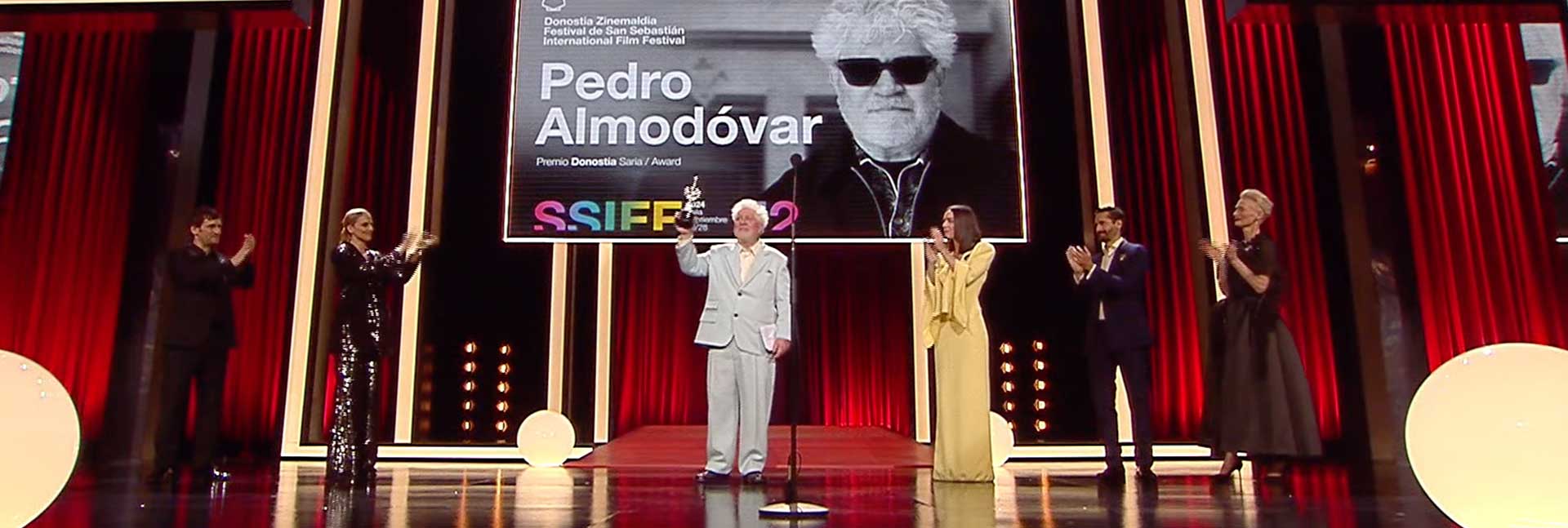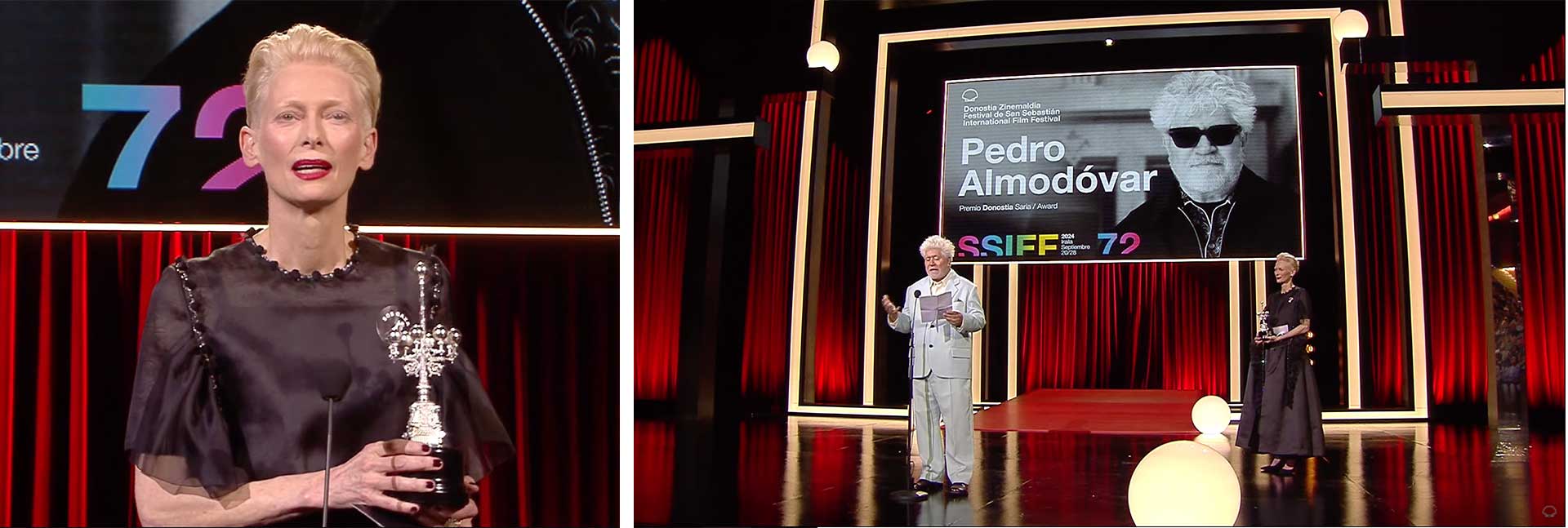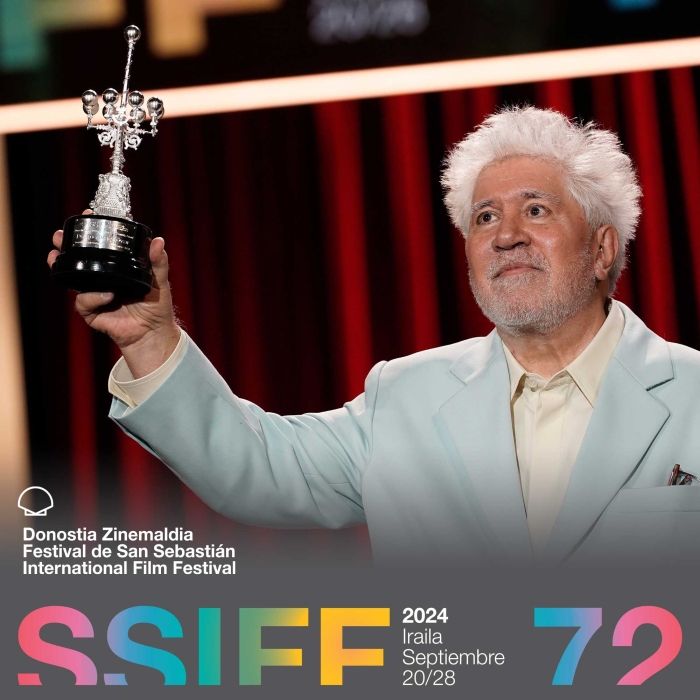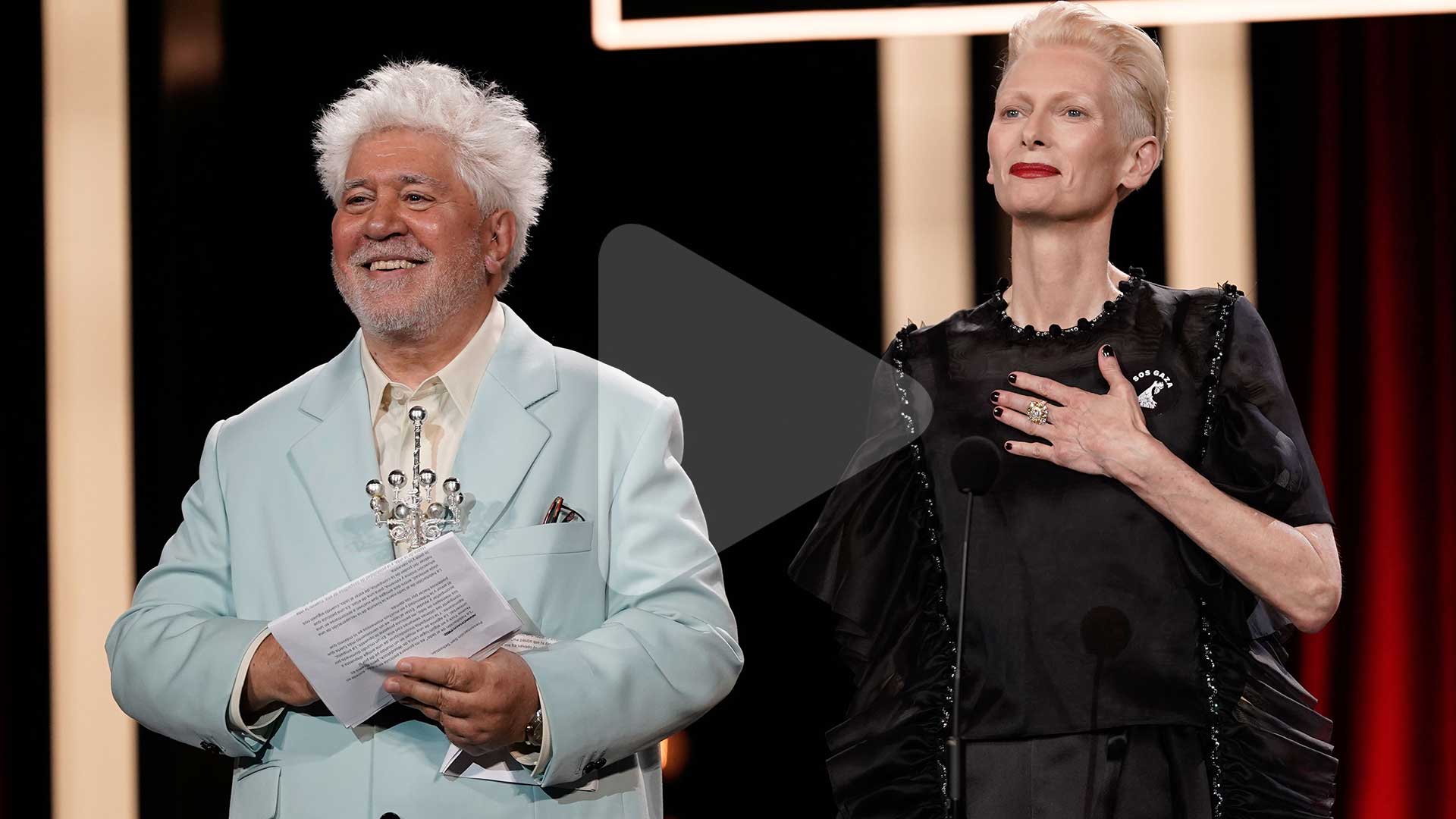Today the director Pedro Almodóvar received the second Donostia Award of the San Sebastian Festival’s 72nd edition from Tilda Swinton in the Kursaal Auditorium, where 44 years after his debut in the New Filmmakers section, he made a passionate defence of freedom, in fiction and in reality. The ceremony was followed by the screening of The Room Next Door, winning movie of the Golden Lion at the Venice Mostra.
In his speech, Almodóvar said that his “passion for cinema” has given his life a direction and has probably saved him from all sorts of dangers. “At my age, an award such as the Donostia, may indicate the end of a path, and a reward for having made my way along it. But I don’t see it that way. For me the cinema is a blessing or a curse. I can’t imagine any other life than that of nonstop writing and directing”, he said, claiming that the alternative “is nothingness”.
“My vocation was and continues to be stronger than myself and everything around me”, he said, before adding: “This profession is the best in the world and that it was well worth having given in to it wholeheartedly. More than ever the cinema is my life and my life would have no meaning without the cinema”. In his opinion, “life, in both fiction and reality, is complicated and entails myriad dangers; but without freedom life isn’t worth living”.
The filmmaker, who just so happens to have celebrated his 75th birthday yesterday, ended his speech with the following advice: “Let’s do everything possible to make the great tragedies, the everyday pain, the lack of understanding, the lies, the lack of empathy, the social injustice, the hatred, all the imaginable negative things, belong to fiction and allow real life to exist fairly, in peace, and highly entertained by the fictions that will only exist on our screens. I know I’m asking too much, but that’s the way I’ve always been, since arriving in Madrid in 1970, with the intention of directing movies. Thank you very much for this award and thank you for hearing me out”.
Juan Diego Botto, Victoria Luengo, Raúl Arévalo and Melina Matthews accompanied Tilda Swinton, co-star of The Room Next Room with Julianne Moore, and Almodóvar himself on stage. “My film is my response to the so many hate messages we see and hear almost every day. Never until now has hatred been possible to organise, anonymously, with impunity. My film is about just the opposite: empathy, companionship and help. And I hope that it moves you as much as it did those of us who made it”, said the director.

An unparalleled contribution to world culture
Swinton said that Almodóvar’s films “offers us humane and familial comfort and enlightenment without end”. “You have enchanted, amused, moved and kept us company for nearly half a century so far and there is no end in sight”, she said in a speech dotted with references to films made by the director from Spain’s La Mancha region.
“We congratulate you tonight for your unparalleled contribution to world culture and for inspiring in us such a devoted affection. You have planted in each one of us a garden of treasure. Your work is good for the world, we thank you for it from the bottom of our hearts. You will live forever. We lucky humans - you make it easier to be one, in spite of everything. Happy birthday, dearest dear. You deserve all the fireworks. With all my love. Your, Tilda”, she ended.

The gala was presented by the actor Eneko Sagardoy, who referred to the award-winner as “a master of audacious, original and extremely personal cinema”. Two videos were shown during the ceremony. The images appearing in one of them reflected the myriad iconic moments in his films, marked by a recognisable visual style and consisting of almost thirty multi-prize winning titles boasting accolades including the Oscars, the Golden Globes, the BAFTAs and the Goyas, among others.
The other video recalled the countless times Almodóvar has visited the San Sebastian Festival in the last 44 years. He precisely presented his debut movie, Pepi, Luci, Bom y otras chicas del montón / Pepi, Luci, Bom (1980) in its New Filmmakers section, going on to compete in the Official Selection with Laberinto de pasiones / Labyrinth of Passions (1982) and returning, out of competition, with La flor de mi secreto / The Flower of My Secret (1995). The Festival not only paid tribute to him in 1993 with The Almodóvar Evening, but also invited him to present the Donostia Award to Al Pacino (1996), Woody Allen (2004) and Antonio Banderas (2010).
Apart from their other participations in the Festival, a good many of his films have been programmed in San Sebastian’s Made in Spain section following their participation in other festivals such as Cannes and Venice: Carne trémula / Live Flesh (1998); Todo sobre mi madre / All About My Mother (1999), recipient of the FIPRESCI Grand Prix at San Sebastian; Hable con ella / Talk to Her (2002); La mala educación / Bad Education (2004), which opened Cannes; Volver (2006), also recipient of the FIPRESCI Grand Prix at San Sebastián; Los abrazos rotos / Broken Embraces (2009), Los amantes pasajeros / I’m So Excited (2013), Julieta (2016) and Dolor y gloria / Pain and Glory (2019), to mention some of the most important.
Almodóvar now adds his name to those of other personalities from the world of Spanish cinema who already hold the Festival’s highest honorary accolade: Fernando Fernán Gómez (1999), Paco Rabal (2001), Antonio Banderas (2008), Carmen Maura (2013), Penélope Cruz (2019), Víctor Erice (2023) and Javier Bardem (2023).






